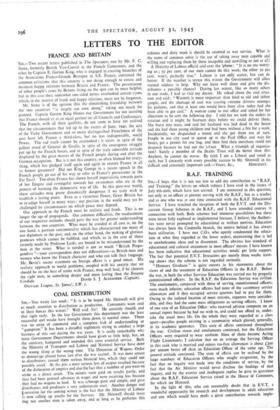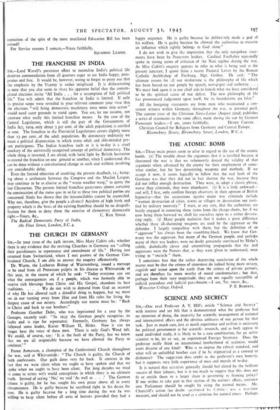R.A.F. TRAINING Sta,—I hope that it is not too late
to add my contribution to " R.A.F. and Training," the letters on which subject I have read in the issues of July 6th-zoth, which have just arrived. I am interested in this question, not only as an officer at present serving with the R.A.F., but as a teacher and as one who was at one time connected with the R.A.F. Educational Service. I have watched the inception of both the E.V.T. and the Dis- cussion Group Schemes in the R.A.F., and I have attended courses in connection with both. Both schemes had immense possibilities but these were never fully explored or implemented because, I believe, the Authori- ties were never prompted by educational or welfare motives. Education has always been the Cinderella branch, the motive behind it has always been utilitarian. I have met C.O.s who openly condemned the educa- tion of what they regarded as the lower orders, maintaining• that it led to unwholesome ideas and to discontent. The obvious low standard of educational and cultural attainment in most officers' messes I have known has been indicative that educational activities would get little support. The fact that potential E.V.T. Insructors get merely three weeks train- ing shows that the scheme is not regarded seriously.
" Honours Graduate " is quite correct in his statements about the views of and the treatment of Education Officers in the R.A.F. Before the war, in both the other Services Education was carried out by properly commissioned officers. In the R.A.F. the Education Service was civilian. The emoluments, compared with those of serving commissioned officers, were much inferior; education officers had none of the customary service allowances and if they occupied service quarters had to pay for them. Owing to the isolated location of most stations, expenses were consider- able, and they had the same mess obligations as serving officers. I know of one case of an Education Office- who received adverse comment on an annual report because he had no wish to, and could not afford to, under- take the usual mess life. On the whole they were regarded as a class apart—peculiar people existing in a community which gloried, generally, in its academic ignorance. This state of affairs continued throughout the war. Civilian status and emoluments continued, but the Education Officers were required to wear uniform. Most of them became Acting Flight Lieutenants; I calculate that on an average the Serving Officer in this rank who is married and enjoys tax-free allowances is about £200 per annum better off than an Education Officer of the same age. The general attitude continued. The state of affairs can be realised by the large numbers of Education Officers who sought resignation, by the fact that an inquiry was made into the conditions of service, by the fact that the Air Minister would never disclose the findings of that inquiry, and by the evasive and inadequate replies he gave to questions about the R.A.F. Education Service raised in the House of Commons, for which see Hansard.
In the light of this, who can reasonably doubt that in E.V.T. a wonderful opportunity for research and development in adult education and one which would have made a great contribution towards imple- mentation of the spirt of the most mutiliated Education Bill has been missed?
For Service reasons I remain,—Yours faithfully, SQUADRON LEADER.



























 Previous page
Previous page